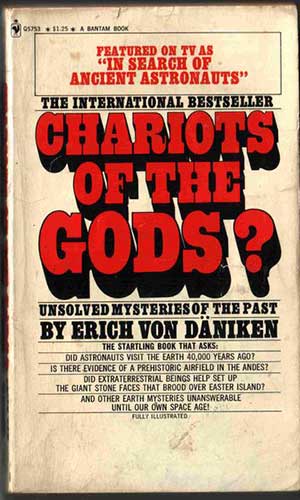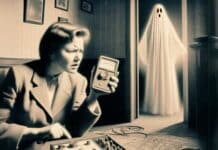Author and researcher EDDIE BRAZIL writes in defence of the paranormal
It would at first appear to be a most incongruous combination; ghosts and intellectual elitism.
What has elitism got to do with ghosts, or the supernatural? After all, those in positions of power or authority are far to busy ruining the country and mucking up our lives to give any thought to those things which go bump in the night.
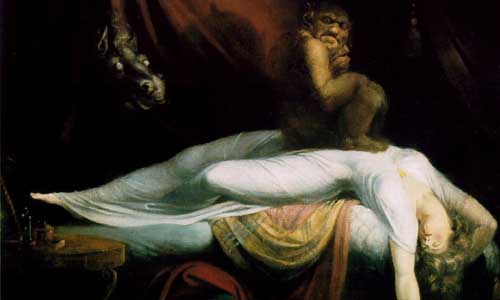
However, it would seem that in some areas of surmised intellectual superiority there are people who embrace academic philosophies which seem to put them at odds with acceptance of the paranormal and those things which at present, are rejected by established science.
This was brought home to me a few years back whilst watching a TV documentary on the life and work of English ghost story writer, MR James.
Contributors to the program included Jonathan Miller, who produced and directed the first filmed adaptation of James ghost story ‘Oh whistle and Ill come to you my lad’, writer David Renwick, illusionist Derren Brown and a few other notable TV personalities all of which one could say have a liberal atheist outlook.
Article: Do Ghosts Exist? Five hauntings that may prove they do!
Each contributor praised James work and hailed him as the father of the modern ghost tale. Yet, when the question was posed whether or not the paranormal was a reality each dismissed the notion of ghosts as nonsense.
Miller commented that he could never subscribe to the idea of ghosts or that human beings survive death. Others stated their agnosticism and scepticism with one person extraordinarily advocating that children should be told Father Christmas and the Easter Bunny weren’t real.
I must admit that these viewpoints not only irritated me but left me feeling somewhat puzzled and angry. It seemed that they were issued not from a secure position of empirical truth based on irrefutable evidence of the paranormal but rather a personal belief born of intellectual arrogance and aloofness with little or no knowledge of psychical research or the emotional needs of children.
Moreover it appeared that the smartarse condescension was itself bred from a high brow, arrogant perspective of people who had been in the lucky position to have enjoyed a university education and ultimately found themselves, by way of an old boys and girls network, into the cosy world of late night talk shows, panel games, satirical mocking of current events and the occasional pithy review for the liberal press.
These were people whose academic, political and every day view of the world were safely observed from privileged ivory towers. It is a situation I have encountered time and again, and it still bewilders me. It beggars the question: Why do the liberal atheist elite viciously and mockingly dismiss the paranormal and anyone who accepts it?
Although it is a question which has previously left me stumbling for answers, I now believe the I have unearthed a reason. For it is a stance born of smugness, class prejudice, a loathing for the lower orders of society and an unflinching belief in the unquestioning power of science . Let me explain.
Class distinction has always been a peculiarly English phenomenon. The titled gentry and blue blood landowners had always looked down up on the hoi polloi with disinterested contempt.
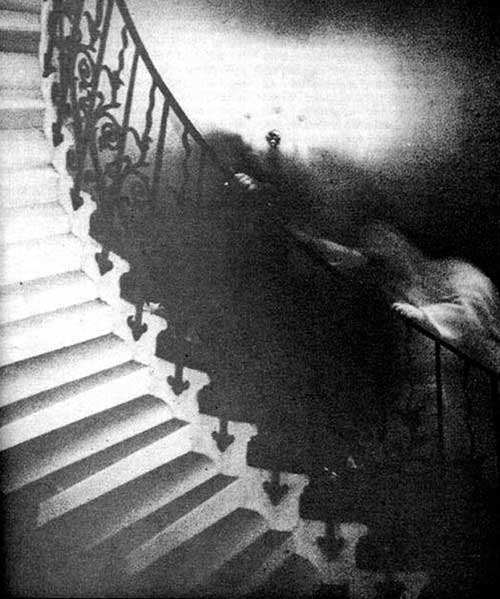
As long as workers could be exploited and help keep the upper classes within their stately homes, the relationship continued with each knowing their place. However, the sacrifice of two wars, inheritance tax, state education and the 60s counter culture happily eroded the authority and position of the hunting shooting set.
Yet such class divisions and intellectual superiority did not disappear as the lords and ladies retreated. Ironically they resurfaced and have been given voice by those people one might be expected to champion the plight of the underprivileged. I speak of the privately-educated university fraternity.
University is often seen as the modern day monastery. Within its secure walls an education is attained, friendships formed, life enjoyed and viewpoints and outlook moulded.
Although it would seem to be a place of individuality and free expression, in reality it harbours and incubates a collective, conformist consciousness which, but for obvious opposing political poles, is no different from the traditional, narrow minded views of any Tory gentleman’s club. Both have rules, both have a code to live by and each has their chauvinism. Yet both intuitions are just as equally remote from the ideas and aspirations of the man in the street. And significantly they are ideas and beliefs which are mocked, derided and in some instances actively suppressed.
For many of us everyday life is hard. The monotonous daily grind in employment most of us hate gradually saps the spirit and destroys the soul. We become as second world war prisoners used to say” Wire happy”. Content with our miserable plight we convince our selves that things could be worse, and we,” Must not grumble”. The misery is soothed either with TV, alcohol, drugs, hobbies or sanctuary in a belief or alternative religion which eases the conviction that somewhere beyond this tedious vale of tears something exists which lies outside the grasp of the sceptics.
In recent years one of those harbours of beguiling mystery safe from the insanity of the world is the paranormal and an acceptance of the existence of ghosts. The proliferation of paranormal research groups, internet ghosts forums, face book ghost hunting communities, programs such as “Most Haunted” and a coming together of like minded people from across the world would appear to suggest that many people need to withdraw from the madness and cynicism of the modern age. T.S. Elliot describes it as “A human kind that cannot bear to much reality”. Yet such a distancing and rejection from the ‘Brave new world’ is nothing new.
The Romantic movement of the middle 18th to late 19th century was a reaction against the political, social, intellectual and artistic attitudes of the time. Forward thinking philosophies unleashed firstly by the renaissance and the reformation and subsequently by ideas and values which were fuelled by advances in science culminating in the industrial revolution had radically altered the value of personal human experience.
Education and technology may have freed man’s mind from the tyranny of ignorance, but spiritually had left him no where to go. Rationalism had robbed him of his mystical safe haven, and the needs of a changing world cast him in to industrial hell hole from which the only escape was his imagination. The romantics addressed this assault on man’s need for mystery and magic by emphasising the power of emotion experienced through music, art, architecture and literature.
The tempestuous and intense music of Beethoven and Wagner. The fantastical paintings of Caspar David Freidrich and Henry Fuseli and the gothic literature of Horace Walpole, William Beckford, Mathew Lewis and Ann Radcliff, with their ruined abbeys, labyrinthine castles, gothic arches, moonlit graveyards and accompanying ghosts and monsters was a direct rebuff to the conformity and logic of classical rationalism. It was an antidote to the banality of every day life.
The Romantics saw human beings as individuals rather than members of society. They emphasised passion and atmosphere over precision and argument. They were interested in feelings, not facts and exalted nature over the artificiality of urban social existence. Their hatred and mistrust of science in the hands of man is reflected in Mary Shelley’s, “Frankenstein” with its theme of mans desire to control nature and become God. It is from the Romantics rejection of the age of reason and their embrace of the mystical and fantastic that modern day perceptions and scepticism of ghosts and the paranormal derives. Phantoms and spirits are never viewed by the ridiculers as a phenomenon which is worthy of debate at the scientific table.
On the contrary they are dismissed as no more than romantic melodrama; stories to frighten children at bedtime or the ravings of deluded sad people who lead empty existences and are gullible enough to be hoodwinked by any thing which, if investigated, always has a rational explanation.
Moreover there is another factor why the paranormal is rejected by the educated elite. The two great wars of the 20th century had shaken mans faith not only in his fellow human beings but also the church. The sacrifice of so many had turned people away from the priest and in to the hands of the medium and spiritualist. Those who had lost loved ones needed answers which the church could not provide.
Secularism asked questions about what was the point of religion, and the church was increasingly seen not as a haven of spiritual deliverance, but rather a corner stone of the establishment which had expected, and encouraged the masses to do their duty and march off to their deaths.
Curiously, this yearning for meaning to what had become a continuous nasty, brutish and short existence resurfaced in the swinging sixties. The revolution of the sixties counter culture successfully confronted the mind numbing conformity of Victorian morals.
It encouraged individualism, free thinking and a rejection of what we may call the” collective submission” of those people who still regularly attended church, trudged miserably off to work, were hypnotised by television, lulled in to the promise of a new tomorrow by lying politicians or intoxicated by the lure of consumerism. For the radicals and atheists it was all a giant lie to keep the plebeians happy with bread and circus.
One of the main thrusts of the counter culture was the need for a new spirituality. Many found it in alternative religions including Hinduism, Islam, Buddism and many other transient cults and sects. There was also a great surge of interest in the Occult.
In 1960 a book appeared on Paris stalls called, “Le Matin des Magicians” (The Morning of the Magicians). It is a curious hodge podge of a volume about magic, alchemy, telepathy, prophecy, Hitler’s astrologers, flying saucers, etc. Its main theme was that the world is a stranger and richer place than science is willing to recognise. What astonished most people at the time was how successful the book became running in to edition after edition and selling over a million copies.
This success was not lost on other writers who saw there was money to be made out of books on astrology, visitors from outer space and the mysteries of the earth.The enthusiasm for the Occult soon spread around the world, and one book in particular came to represent the craze for all things strange and thought provoking. Eric Von Danikens’ “Chariot of the Gods”.
Von Danikens premise that thousands of years ago Earth had been visited by extra-terrestrials from outer space caught the public imagination. Although it was full of inaccuracies and was derided by the scientific community as baloney it never the less sold over 30 million copies. Von Daniken followed up his success with three further books expanding his theory all of which again sold in their millions.
Soon the genie was out of the bottle and any writer worth his salt leapt on to the paranormal bandwagon. It was not only authors who strove to cash in but also palmists, fortune tellers, tea leaf readers, mediums, spiritualists and those who had crank theories about ghosts, demons, monsters.
Anyone who looked and sounded as if they new the answer to the big secret was read, consulted and believed. And as all this occult mania griped the world the intellectually superior atheists looked down from their ivory towers with arms folded smirking. If religion was the opium of the masses than this new paranormal craze was the heroin.
Of course, in some respects they were correct. Most of those who looked to milk the new fad for all it was worth were nothing more than phoneys who tapped in to the many weak and emotionally vulnerable people who desperately wanted to believe. (Renowned medium Doris Stokes would be uncovered as a fraud). Yet what the smug sceptics failed to acknowledge is that those who research the paranormal to understand its workings and so hopefully gain a better idea of mankind’s place in the whole scheme of things are eons apart from the fake mediums, bogus spiritualists and those who look upon the supernatural as a party time game only worthy of a quick thrill or buck in the dark. As usual one brush is used to tar all, and it is easier to attack, and discredit the bogus than to seriously view the genuine.
The main problem with sceptics and atheists is their inability to employ logic to their own argument. Take for example the question of the existence or non existence of God.
Of course, it is impossible to establish 100% either way. Yet the elite atheists know this but still cling rigidly to their credo. In other words why would a sceptic believe 100% in the non existence of God, or for that matter Ghosts, when it is virtually impossible to prove 100% that He, or they do exist. The key thing is to keep an open mind.
To use a horse racing analogy; if I study the form of a horse and see that it has run 10 times; won four, came second twice, fell three times and pulled up once, I can’t guarantee 100% that it will win the 11th race. But going on the form, or evidence of his previous races I can say that he might win or could win. The atheist would say that the horse doesn’t exist and there for could not compete in the race. At the end of the day it depends on ones attitude and viewpoint. To the believer it is a matter of Faith; to the elitist sceptic it is an effrontery to his intelligence and a ratchet up of his paranoia.
This elitists head burying is not confined to individuals. We find its greatest exponents in mutually back slapping groups such as CSICOP, The Committee for the Scientific Claims of the Paranormal.
Unlike Britain’s Society for Psychical Research (SPR) which was established in the late 19th century to examine by scientific means the claims of mediums, psychics, and accounts of ghosts and hauntings to see if they were true, CSICOP, on the other hand was launched from a position of total and absolute scepticism. Their repeated mantra is that the paranormal does not, and cannot exist.
This is pretty much akin to the Catholic church forcing Gallileo to recant his theories regarding the heavens. There may well have been some enlightened Cardinals who took Gallileos ideas on board, but it would have been impossible for them to let their views be known less they be carted off for heresy and ostracised from the club they belonged to. In other words, it cannot be allowed to be true.
When groups form themselves in to self congratulating fraternities no member wants to upset the apple cart and cast doubt on the agreed faith for he knows he will be shouted down. The BBC is a good example. In CSICOP case, those members who have had the temerity and courage to question their methods of research, and come to accept that some paranormal phenomena may be genuine, have been castigated and forced out.
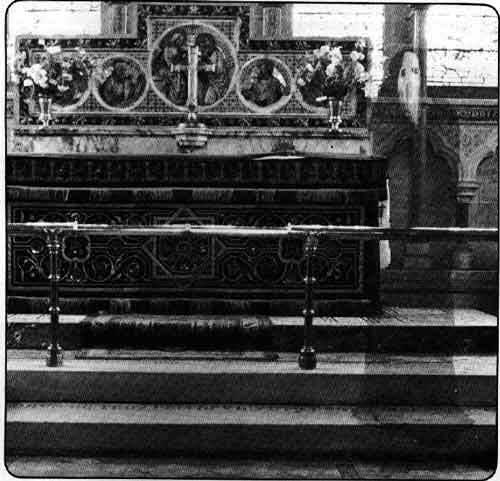
Paradoxically CSICOP’s rigid adherence to their creed has forced it in to a painted corner of its own orthodoxy which is no different from the closed thinking of any religious group, political party, faction or camp. In rejecting alternative viewpoints or heaven forbid, the truth, they have nullified their objective and become a one belief cult. A kind of paranormal political correctness. They are terrified that if just one piece of paranormal phenomena was proven to be scientifically beyond doubt their whole sceptical world would come crashing down around their disbelieving eyes and ears. So they keep the faith, and refuse to see.
The main point of this rant or argument is that after 45 years as a paranormal researcher it still astounds me when I hear that people still reject the paranormal and the existence of ghosts, and not only reject it, but vehemently and passionately believe it to be nonsense.
My counter argument I have already stated. But to finish – my own discoveries over the years have led me to accept that what we term the paranormal not only exists but accounts for a world of wonder and weirdness that science continually tries to skirt around as if it didn’t matter. It’s as if humankind is frightened of confronting something it has no control over. Yet the only way to understand anything is to study it. To me it seems that scientists have always asked the wrong questions and looked in the invalid areas. As for the sceptics it would appear that their intellectual arrogance not only blinds them to the truth , but prevents them from looking further that their own importance.
For those of you who are still open to the subject of ghosts, but need a little more convincing, I recommend three cases to study.
- The Cardiff Poltergeist
- The Black Monk of Pontefract
- The Stocksbridge Haunting
The Black Monk and Stocksbridge cases can be found in “Extreme Hauntings, Britain’s most terrifying ghosts” written by myself and my colleague, Paul Adams. The Cardiff Poltergeist can be found online. If after studying these accounts you are still left unconvinced, then perhaps nothing will persuade you of the existence of the paranormal. And I suppose that will be the verdict of the many, because at the end of the day where elitism, arrogance, closed mindedness and intellectual snobbery are concerned, human beings would seem to have a monopoly.
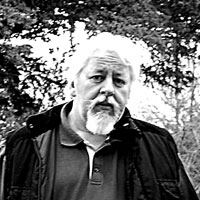
EDDIE BRAZIL was born in Dublin in 1956. He is a writer, photographer and paranormal investigator. He is co- author, with Paul Adams and Peter Underwood, of The Borley Rectory Companion and Shadows in the Nave: A Guide to the Haunted Churches of England. In 2012, with Paul Adams, he co wrote Extreme Hauntings: Britain’s Most Terrifying Ghosts, and in 2013 he published the first ghostly guide to his hometown Haunted High Wycombe. He has recently completed a bloody history of Buckinghamshire, which will be published in November. He is also a guitarist , and in 1983 wrote the theme music to the British comedy movie,”Expresso Splasho” which featured Gary Oldman and Daniel Peacock. Eddie lives with his wife and Daughter in Hazlemere, Buckinghamshire. Find out more at his website here.


